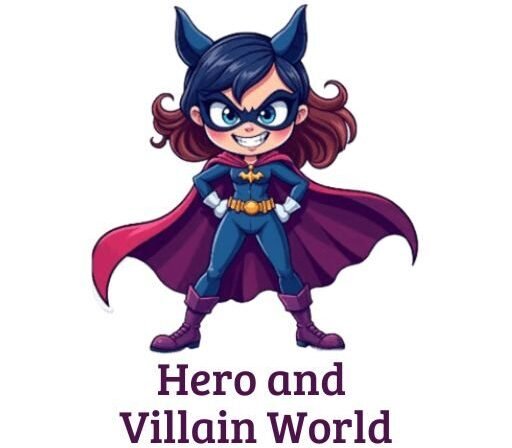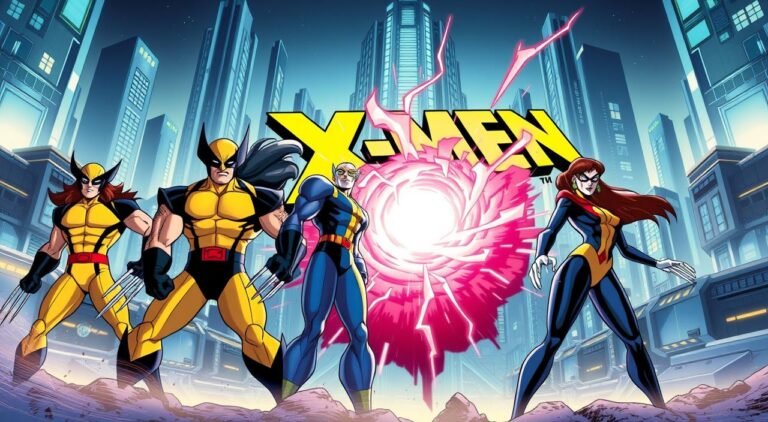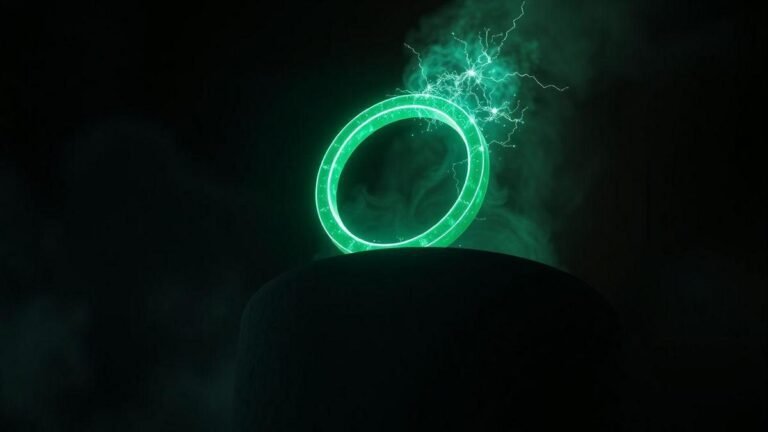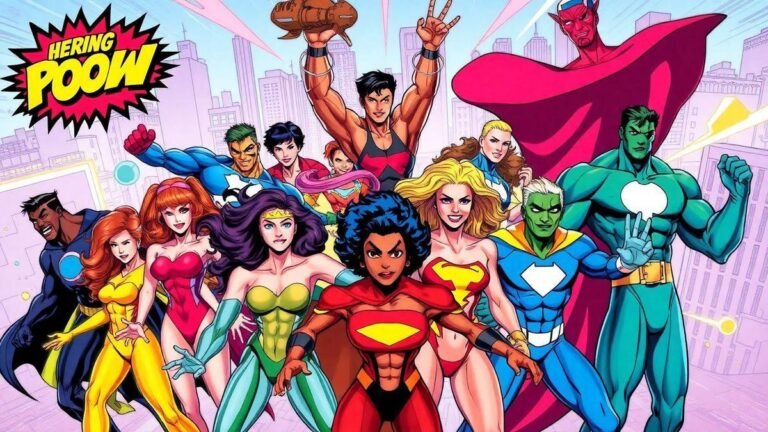Black Panther: The King of Wakanda’s Responsibilities
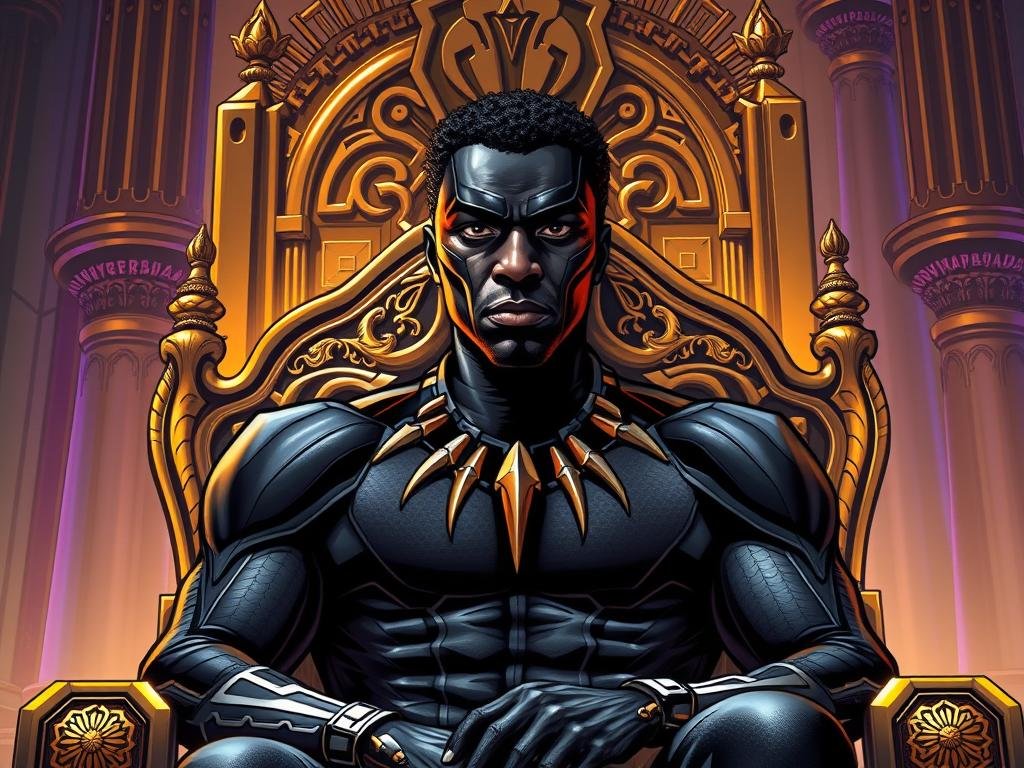
As I reflect on the character that has captivated audiences worldwide, I’m drawn to Black Panther, the legendary figure from Marvel Comics.
Created by the visionary Stan Lee and the artistic genius Jack Kirby, T’Challa, the birth name of Black Panther, is not just a superhero but the king of the technologically advanced nation of Wakanda.
The character’s debut in Fantastic Four #52 in 1966 marked a significant milestone as the first Black superhero in mainstream American comics, breaking new ground and paving the way for future generations.
As the protector of Wakanda, T’Challa faces the daunting task of balancing his responsibilities as a monarch with his duties as a superhero, making him a fascinating and complex character.
The Legacy of the Black Panther
The Black Panther legacy is a complex blend of tradition, responsibility, and innovation. As the leader of Wakanda, T’Challa accepted the mantle of Black Panther from his father, King T’Chaka, continuing a lineage that underscores the significance of this role in Wakandan culture.
The Mantle’s Significance in Wakandan Culture
The Black Panther is not just a superhero title; it’s a sacred role that embodies the people‘s trust and the nation’s heritage.
Wakandans view the Black Panther as a symbol of their nation‘s strength and resilience. The mantle signifies the protector of Wakanda, a guardian of its traditions, and a forward-thinking leader.
- The Black Panther is a revered figure, embodying the nation’s values and history.
- The role involves a deep connection to Wakandan culture and its spiritual beliefs.
The Dual Role: Monarch and Protector
T’Challa, as the king, must balance his responsibilities as a monarch with his duties as the Black Panther.
This dual role requires him to navigate between diplomatic engagements and direct action, making it a unique challenge compared to other superheroes. For more insights on Wakanda’s legacy, visit Wakanda Forever: The Legacy of Black.
The complexity of being both a leader and a protector means T’Challa must make decisions that sometimes put his duties as king in conflict with his responsibilities as Black Panther, requiring a delicate balance between tradition and progress.
The Creation of a Cultural Icon
As a cultural icon, Black Panther’s origins are deeply rooted in the vision of its creators, Stan Lee and Jack Kirby. Their collaborative effort brought forth a character that not only represented a new era in comic book history but also filled a significant gap in representation.
Stan Lee and Jack Kirby’s Vision
The legendary comic book creators Stan Lee and Jack Kirby are credited with bringing Black Panther to life.
Their vision was not just to create another superhero but to craft a character that embodied the richness of African culture and the technological advancements of a fictional nation, Wakanda. This vision was revolutionary, setting the stage for a new kind of storytelling in comics.
The First Black Superhero in Mainstream Comics
Black Panther was the first Black superhero in mainstream American comic books, predating other notable characters like Luke Cage and Falcon.
The emergence of Black Panther in the comic book world marked a significant milestone in the history of superheroes, offering representation and a new perspective to readers worldwide.
The character’s introduction in Fantastic Four #52 (1966) was a landmark moment, showcasing not just a hero but a king and a symbol of a technologically advanced nation.
| Character | First Appearance | Notable Features |
|---|---|---|
| Black Panther | Fantastic Four #52 (1966) | First Black superhero, King of Wakanda, Enhanced abilities |
| Luke Cage | Hero for Hire #1 (1972) | Superhuman strength, virtually indestructible |
| Falcon | Captain America #117 (1969) | First African American superhero, Trained bird companion |
The impact of Black Panther extends beyond the comic book pages, influencing the broader world of superheroes and popular culture.
By being portrayed as a genius, a king, and the leader of the most technologically advanced nation in the Marvel universe, Black Panther broke new ground in representation, paving the way for greater diversity in superhero comics.
T’Challa’s Origin Story
Becoming the Black Panther was not just a matter of inheritance for T’Challa, but a result of rigorous training and a series of challenges. His journey to this iconic role was shaped by his upbringing, education, and the traditions of Wakanda.
The Death of King T’Chaka
T’Challa’s path to becoming the Black Panther was significantly influenced by the death of his father, King T’Chaka. This event not only marked a personal loss but also set T’Challa on a course to claim his rightful place as the king and protector of Wakanda.
The circumstances surrounding King T’Chaka’s death played a crucial role in T’Challa’s understanding of his responsibilities and the challenges he would face as the new Black Panther.
The Path to Becoming Black Panther
Upon returning to Wakanda, T’Challa participated in a ritual combat challenge to prove his worth to become the next Black Panther. He defeated his uncle S’Yan, demonstrating his combat prowess and strength.
Following his victory, T’Challa underwent a ceremony where he consumed the heart-shaped herb, granting him enhanced abilities and a spiritual connection to the Panther God.
This combination of physical and spiritual empowerment prepared T’Challa for his role as Wakanda’s protector and solidified his position as the Black Panther.
T’Challa’s rigorous training in various combat styles and his unique blend of intellect, physical strength, and royal upbringing made him particularly suited to become one of Marvel’s most formidable heroes.
His journey from prince to Black Panther is a testament to his dedication and the rich cultural heritage of Wakanda.
| Aspect | Description | Significance |
|---|---|---|
| Ritual Combat | T’Challa defeated his uncle S’Yan in combat. | Proved his worth to become the Black Panther. |
| Heart-Shaped Herb | Grants enhanced abilities and spiritual connection. | Empowers T’Challa for his role. |
| Royal Upbringing | Combines intellect, physical prowess, and leadership. | Makes T’Challa a well-rounded hero. |
First Appearance and Early Adventures
The debut of Black Panther in Fantastic Four #52 was a significant moment in Marvel history. This event marked the introduction of the first black superhero in mainstream comics, a character that would go on to play a crucial role in the Marvel Universe.
Debut in Fantastic Four #52
Black Panther’s first appearance was not just a simple introduction of a new character; it was the beginning of a rich cultural icon. Created by Stan Lee and Jack Kirby, Black Panther, also known as T’Challa, was introduced as the king of the fictional nation of Wakanda.
His first appearance in Fantastic Four #52 (July 1966) was a pivotal moment, setting the stage for his future roles in the Marvel Universe.

Early Storylines and Character Development
Following his debut, Black Panther made several guest appearances, including in Fantastic Four Annual #5 (1967) and teaming up with Captain America in Tales of Suspense #97-99 and Captain America #100 (January – April 1968).
These early storylines were crucial in developing T’Challa’s character, showcasing his intelligence, dignity, and commitment to justice.
In May 1968, Black Panther joined the Avengers in The Avengers #52, becoming one of the earliest non-founding members of Earth’s Mightiest Heroes.
This marked a significant point in his character development, as he navigated being part of a team while maintaining his responsibilities as the king of Wakanda.
| Comic Issue | Year | Significance |
|---|---|---|
| Fantastic Four #52 | 1966 | First appearance of Black Panther |
| Fantastic Four Annual #5 | 1967 | Guest appearance |
| Tales of Suspense #97-99 | 1968 | Team-up with Captain America |
| The Avengers #52 | 1968 | Joined the Avengers |
The Evolution of Black Panther in Comics
The Black Panther’s evolution in comics is a story of creative reinvention and cultural relevance. Over the years, the character has been reshaped by various creative talents, ensuring its continued relevance.
Notable Comic Series and Story Arcs
The Black Panther has been featured in several notable comic series and story arcs. One significant run was Christopher Priest’s 1998 Black Panther vol. 3, which re-invented the character and earned critical acclaim.
As scholar Todd Steven Burroughs noted, this new vision combined elements of Frank Miller’s Batman and South African president Nelson Mandela, marking a significant shift in the character’s narrative.
Other influential storylines include Don McGregor’s pioneering work in the 1970s, which established T’Challa as a complex character and Wakanda as a fully realized setting. These story arcs have contributed to the richness of the Black Panther mythos.
Influential Writers and Artists
The title of Black Panther has been shaped by numerous influential writers and artists. Christopher Priest, for instance, was the first Black creator to become an editor at Marvel, bringing a fresh perspective to the character.
Reginald Hudlin, as one of the first Black writers to handle the character for an extended run, also brought new insights. More recently, Ta-Nehisi Coates’ literary approach in the 2010s attracted new readers and explored themes of governance and national identity, further enriching the character’s narrative.
These creative talents have played a crucial role in maintaining the Black Panther’s relevance and appeal, ensuring the character remains a significant figure in the world of comics.
The Heart-Shaped Herb and Panther Powers
The heart-shaped herb is central to the Black Panther’s powers, granting him enhanced abilities and a spiritual connection to his ancestors. This sacred plant, native to Wakanda, is the key to T’Challa’s enhanced physical abilities and his connection to the ancestral plane.
Enhanced Abilities and Skills
Consuming the heart-shaped herb enhances T’Challa’s physical abilities, making him one of the most formidable fighters on the planet.
The Black Panther’s suit, which has evolved over the years, incorporates Vibranium enhancements that absorb impact, making him less susceptible to physical blows or gunshots. More concentrated Vibranium pads in the feet and hands allow for easier climbing and enhanced strength.
| Ability | Description |
|---|---|
| Enhanced Strength | Grants superhuman strength, allowing the Black Panther to perform feats beyond human capability. |
| Enhanced Speed | Provides the Black Panther with speed and agility that surpasses that of an average human. |
| Vibranium Suit | The suit absorbs impact, making the Black Panther less susceptible to physical harm. |
The Spiritual Connection to the Panther God
The Black Panther’s powers are not just physical; they are also deeply spiritual. The heart-shaped herb allows T’Challa to connect with the ancestral plane, where he can commune with past Black Panthers and seek their guidance.
This spiritual dimension adds depth to the character, connecting him to Wakanda’s history and traditions. The mystical aspects of the Black Panther’s powers represent his connection to both his personal lineage and the broader cultural heritage of Wakanda.
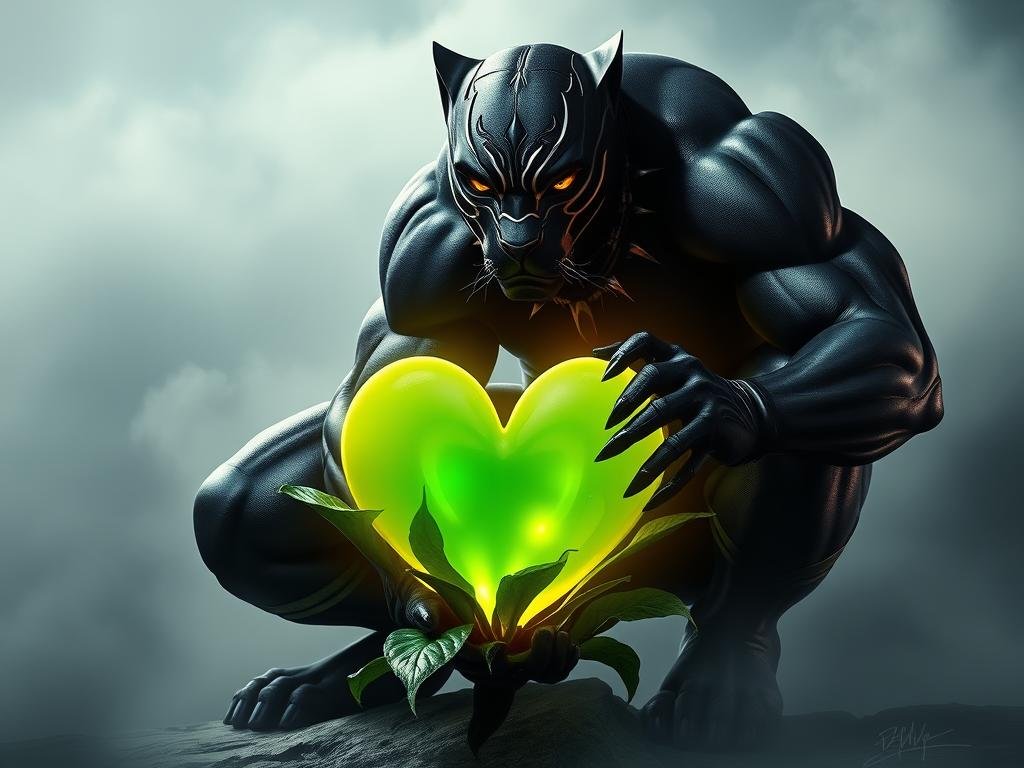
The spiritual connection to the Panther God, Bast, is a crucial aspect of the Black Panther’s identity. It emphasizes the character’s role not just as a king or a superhero, but as a spiritual leader who embodies the traditions and values of Wakanda. This connection is a powerful symbol of the Black Panther’s commitment to his people and his heritage.
Wakanda: The Advanced African Nation
Wakanda, a nation hidden from the rest of the world, is a marvel of technological advancement and cultural richness. As I explore this fascinating society, I am struck by its unique blend of tradition and innovation.
Vibranium and Technological Superiority
Wakanda’s technological superiority is largely due to its rich deposit of vibranium, a metal with extraordinary properties.
This resource has enabled the Wakandans to develop cutting-edge technology that is far beyond anything found in the rest of the world. Their innovative use of vibranium has led to significant advancements in various fields, making Wakanda a powerhouse of technological progress.
The vibranium’s impact on Wakandan society is multifaceted. Not only has it driven technological innovation, but it has also played a crucial role in shaping the nation’s culture and history.
The careful management and utilization of this resource have allowed Wakanda to maintain its sovereignty and protect its people.
Cultural Traditions and Political Structure
Wakanda’s cultural traditions are deeply intertwined with its political structure. The nation operates under a unique system that combines an ancient monarchy with tribal councils and modern governance.
This blend of old and new allows Wakanda to maintain its rich cultural heritage while embracing progress. The various tribes within Wakanda, including the Jabari, Border, Mining, Merchant, and River tribes, each contribute their distinct cultures to the nation’s diverse tapestry.
The Dora Milaje, an all-female royal guard, play a significant role in Wakandan society, serving not only as protectors of the king but also as symbols of the nation’s cultural identity.
T’Challa’s rule has brought about a period of reflection on Wakandan traditions, particularly regarding the nation’s historical isolationism. This has led to a nuanced discussion on balancing tradition with the need for progress and global engagement.
Black Panther: The King of Wakanda’s Responsibilities
The Black Panther’s duties extend far beyond the borders of Wakanda, influencing global events while maintaining the delicate balance between tradition and progress. As the King of Wakanda, T’Challa is not only the monarch but also the embodiment of his nation’s values and strength.
T’Challa’s protection of Vision, which subsequently brought Thanos’ army to Wakanda, exemplifies the Black Panther’s role in global conflicts. This event highlights the challenges T’Challa faces in protecting Wakanda’s sovereignty while being an integral part of the larger superhero landscape.
Protecting Wakanda’s Sovereignty
Wakanda’s isolationism has been a cornerstone of its survival, allowing it to maintain its technological superiority and cultural identity.
However, T’Challa’s involvement with the Avengers and other global events has necessitated a reevaluation of this stance.
The decision to reveal Wakanda to the world has been one of T’Challa’s most controversial moves, marking a significant shift in Wakandan policy and opening the nation to new opportunities and challenges.
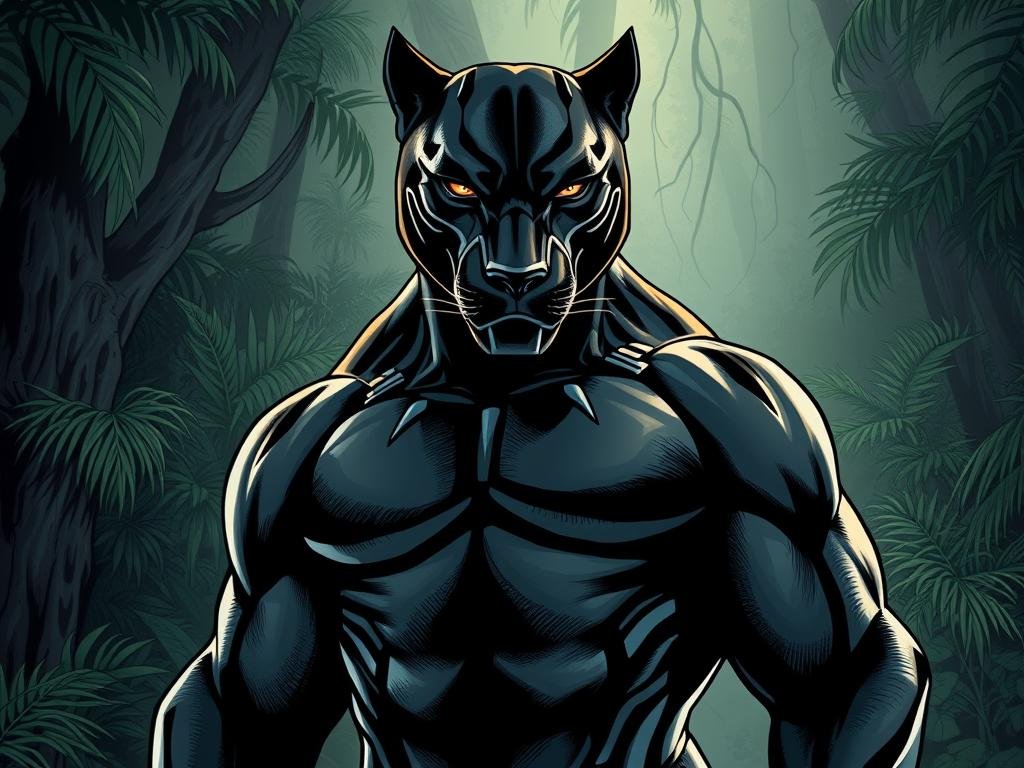
Balancing Tradition and Progress
T’Challa’s efforts to modernize Wakandan society while respecting its cultural heritage represent a delicate balancing act.
His education abroad and experiences with the Avengers have broadened his perspective on Wakanda’s place in the global community, sometimes putting him at odds with more conservative elements within Wakandan society.
The challenge lies in embracing progressive change without eroding the traditional values that define Wakanda and its people. As a leader, T’Challa must navigate these complexities to ensure Wakanda’s continued prosperity and relevance on the world stage.
By examining T’Challa’s role as the Black Panther and King of Wakanda, we gain insight into the intricate dynamics of leadership, cultural preservation, and national identity in a rapidly evolving world.
Key Characters in the Black Panther’s World
The world of Black Panther is rich with characters that play crucial roles in T’Challa’s life and reign. As the king of Wakanda, T’Challa is surrounded by a diverse cast of characters that contribute to his journey as a superhero and a monarch.
The Royal Family and Allies
T’Challa’s relationships with other characters are significant to his role as the Black Panther. In the Super Hero community, he has worked closely with teams like the Avengers, the Ultimates, and the Crew.
Notably, Captain America personally recommended T’Challa for Avengers membership, highlighting the respect he earned. T’Challa has also formed close bonds with characters like Luke Cage, Falcon, and Brother Voodoo.
His interactions with other heroes, such as Blade, demonstrate his collaborative approach to superhero work. For more insights on T’Challa’s alliances and his suit’s capabilities, visit Black Panther’s Vibranium Suit.
Moreover, T’Challa’s friendships extend beyond the superhero realm. He befriended government employee Everett K.
Ross during his extended stay in the United States, showcasing his ability to form connections outside of Wakanda. His relationship with Iron Man, while sometimes rocky, is ultimately respectful, demonstrating T’Challa’s diplomatic skills.
The Dora Milaje: Wakanda’s Elite Guardians
The Dora Milaje, Wakanda’s all-female special forces, serve as the Black Panther‘s personal bodyguards.
They are known for their exceptional combat skills and are among the most formidable warriors in the Marvel universe. The Dora Milaje have a rich history, originally serving not only as protectors but also as potential wives for the king.
Notable members of the Dora Milaje include Okoye, their leader, and Nakia, whose character has evolved differently in comics and film adaptations.
Okoye is renowned for her bravery and loyalty, while Nakia’s story varies, showcasing the diverse portrayals of these characters across different media. The Dora Milaje are trained in advanced combat techniques, making them a force to be reckoned with.
The Dora Milaje represent both Wakandan tradition and female empowerment, making them fascinating characters beyond their role as T’Challa’s protectors.
Their presence in the stories highlights the importance of strong, skilled women in Wakandan society and their contribution to the nation’s strength and security.
Notable Adversaries and Conflicts
The Black Panther has faced numerous adversaries throughout his comic book history, each presenting a unique challenge to his rule.
Erik Killmonger: The Challenger to the Throne
Erik Killmonger is one of Black Panther’s most significant enemies, driven by a complex mix of motivations including a desire for power and a connection to Wakandan heritage.
His confrontation with T’Challa is not just about control but also about ideology and the future of Wakanda. Erik’s actions led to a significant conflict within Wakanda, testing the nation’s resolve and T’Challa’s leadership.
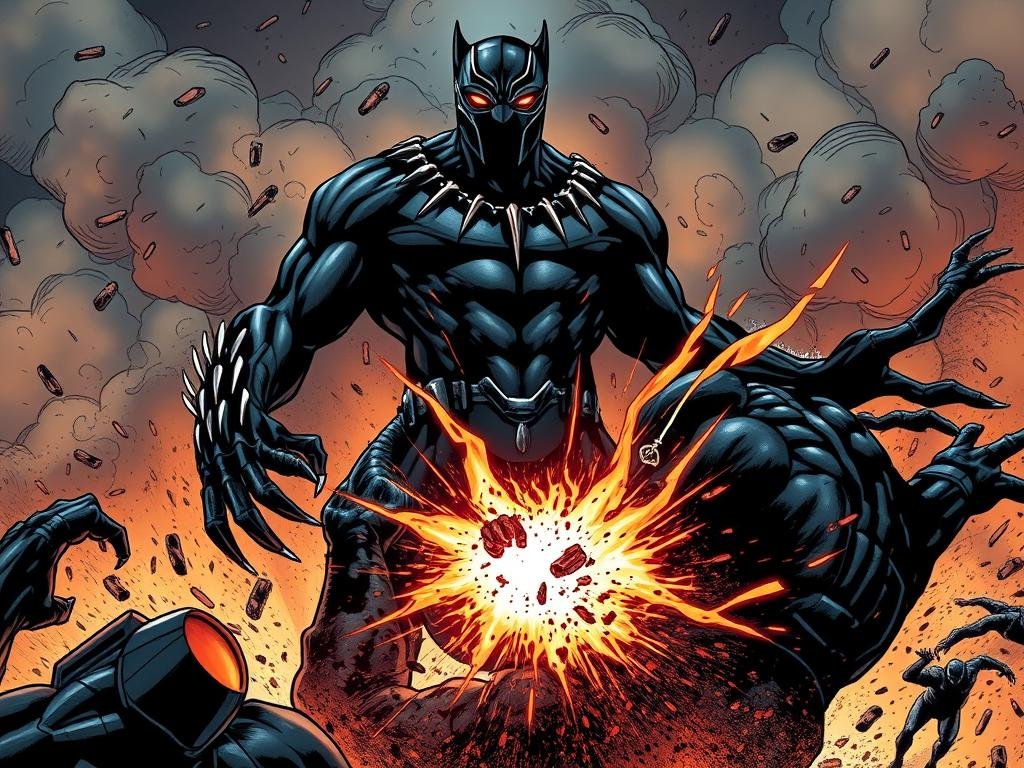
Other Significant Enemies
Black Panther’s rogues gallery includes other notable villains. Ulysses Klaue, a mercenary obsessed with vibranium, has been a thorn in T’Challa’s side, particularly after he murdered T’Challa’s father.
M’Baku, the leader of the Jabari tribe, has repeatedly challenged T’Challa for the throne, showcasing the internal power struggles within Wakanda.
Additionally, villains like Achebe and Doctor Doom have posed significant threats, with the latter attempting to steal Wakanda’s vibranium and nearly killing T’Challa.
Namor, once an ally, turned enemy after being possessed by the Phoenix Force, leading to a bitter rivalry.
These adversaries have all contributed to the rich tapestry of Black Panther’s story, often pushing him to his limits and testing his resolve as a king and a hero, sometimes even leading to death-defying situations.
The diverse range of enemies faced by Black Panther highlights the complexity of his role as both a monarch and a superhero, a true test of a man with great responsibility.
Black Panther’s Role in the Avengers
By joining the Avengers, T’Challa expanded Wakanda’s influence on the global stage. As Black Panther, he brought a unique blend of technological advancement and cultural heritage to the team.
This integration not only enhanced the Avengers’ capabilities but also provided Wakanda with a strategic foothold in international affairs.
Joining Earth’s Mightiest Heroes
T’Challa’s decision to join the Avengers was a significant step in his evolution as a global hero. It marked a transition from a primarily national role to an international one, where he worked alongside other mighty heroes like Captain America.
This alliance was particularly evident during the Civil War, where Black Panther initially supported the Superhuman Registration Act before switching sides to support Captain America’s stance.
The complexities of being both a monarch and an Avenger created interesting dynamics. T’Challa had to balance his duties to Wakanda with his responsibilities to the team, often navigating through challenging decisions that impacted both his nation and the world.
Strategic Alliances and Global Influence
As a member of the Avengers and the secretive Illuminati, T’Challa formed strategic alliances that bolstered Wakanda’s global position. His diplomatic skills and political acumen made him a valuable asset in these groups, allowing him to forge strong bonds with other influential figures like Iron Man and Doctor Strange.
During the Civil War, Black Panther’s actions had significant implications for the global superhero community. His shift in allegiance underscored the complexities of his role and the nuanced decisions he had to make, affecting not just Wakanda but the world at large.
In conclusion, Black Panther’s role in the Avengers has been pivotal, leveraging his unique position to foster cooperation and advance the interests of both Wakanda and the broader community of heroes.
Strengths and Weaknesses of the Character
In examining the Black Panther, it’s clear that T’Challa’s greatest assets and liabilities are deeply intertwined with his role as a leader and a hero. As the king of Wakanda, T’Challa faces numerous challenges that test his abilities as the Black Panther.
T’Challa’s Greatest Assets
T’Challa’s role as the Black Panther is multifaceted, involving both impressive powers and human vulnerabilities.
One of his greatest strengths is his enhanced physical abilities, thanks to the Heart-Shaped Herb and his access to Wakanda’s advanced technology.
As “the king of Wakanda, T’Challa has the weight of his people’s expectations on his shoulders, and he strives to live up to his father’s legacy.”
His strategic thinking and leadership skills are also significant assets, allowing him to navigate complex geopolitical situations and make difficult decisions.
Vulnerabilities and Challenges
Despite his enhanced abilities, T’Challa remains human and vulnerable to sufficient force, making his physical limitations a significant weakness. Additionally, his sense of duty can sometimes be exploited by enemies who threaten Wakanda to manipulate him.
T’Challa’s pride and sometimes rigid adherence to tradition can lead to blind spots in his judgment, further complicating his role as a leader.
The Black Panther must also contend with the challenge of balancing his responsibilities to Wakanda and the wider superhero community, often creating impossible situations where he must choose between competing loyalties.
As T’Challa navigates these challenges, he faces a significant challenge in his personal life, struggling to balance his responsibilities as a king with his desires as an individual.
This internal conflict is a crucial aspect of his character, making him a more relatable and human man behind the superhero persona. Ultimately, T’Challa’s experiences shape his life and inform his decisions, influencing the fate of Wakanda and the world at large.
Critical Reception and Cultural Impact
With its debut in the late 1960s, Black Panther not only became the first Black superhero in mainstream American comics but also left a lasting legacy. As a pioneering figure, the character has garnered significant attention for its cultural significance and representation.
Acclaim for the Character and Stories
The Black Panther character has been praised for its unique blend of Afrofuturism and superhero elements.
The stories surrounding the character have been acclaimed for their rich world-building, drawing readers into the technologically advanced nation of Wakanda.
By presenting a futuristic African society, the comic challenged Western assumptions about Africa and its place in the world.
Representation and Influence in Popular Culture
The influence of Black Panther extends far beyond the comic book world. As an early example of Afrofuturist aesthetic, the character has inspired a generation of creators and artists.
The massive success of the 2018 film adaptation transformed Black Panther into a global cultural phenomenon, cementing its place in history.
The character’s impact on representation in media has been significant, paving the way for more diverse storytelling and characters.
In conclusion, the critical reception and cultural impact of Black Panther underscore its importance in the history of comics and beyond.
Black Panther Beyond Comics
Beyond the realm of comics, the Black Panther has become a staple in modern pop culture, featuring in numerous adaptations and interpretations. This expansion has not only broadened his audience but also cemented his title as a cultural icon.
Film and Television Adaptations
The Black Panther has made significant appearances in film and television, with one of the most notable being the 2018 Marvel Cinematic Universe (MCU) movie “Black Panther,” which garnered critical acclaim and commercial success.
This film marked a pivotal moment in the character’s history, bringing him to a wider audience and setting a new standard for representation in superhero films.
Television adaptations have also played a crucial role in keeping the character relevant, with appearances in animated series that explore various storylines and deepen the viewer’s understanding of Wakanda and its people.
Video Games and Other Media
In the realm of video games, Black Panther has been featured in several titles, including Marvel’s Avengers, Marvel vs. Capcom, LEGO Marvel Super Heroes, and Marvel Ultimate Alliance.
These appearances have allowed players to engage with the character in different ways, from fighting alongside him in ensemble games to exploring his solo adventures. The upcoming open-world Black Panther game developed by EA promises to further expand his reach, offering a more immersive experience.
Beyond video games, the title of Black Panther has been used in various other media, including novels, audio dramas, and merchandise, making him a recognizable global brand.
His influence extends into educational materials, museum exhibits, and academic discussions, demonstrating his impact beyond the realm of entertainment.
At the same time, the character’s presence in different forms of media has been a significant factor in his enduring popularity over time.
Conclusion: The Enduring Legacy of Wakanda’s King
As we conclude our journey through the world of Black Panther, it’s clear that this iconic character has left an indelible mark on popular culture.
The Black Panther has evolved from a groundbreaking comic book character to a global cultural icon, symbolizing strength, courage, and innovation.
Throughout his history, T’Challa has maintained his core identity while adapting to changing times, making him a unique and compelling figure in the superhero landscape.
The world of Wakanda, with its rich cultural heritage and advanced technology, has become one of the most fully realized fictional settings in comics.
The Black Panther’s legacy continues to grow through new comics, films, games, and other media, ensuring that the King of Wakanda will remain an important figure in popular culture for generations to come.
As a hero and a symbol, Black Panther has challenged stereotypes and expanded representation in comics, creating new possibilities for diverse characters and stories.
Some frequently asked questions about Black Panther include:
– What are Black Panther’s powers and abilities?
– How has Black Panther’s character evolved over time?
– What is the significance of Wakanda in the Marvel Universe?
– Who are some of Black Panther’s most notable allies and enemies?
– How has Black Panther been represented in different media, such as film and television?
– What is the role of the Dora Milaje in Wakandan society?
– How does Black Panther’s legacy continue to impact popular culture?
– What can we expect from future Black Panther stories and adaptations?
For more in-depth articles about your favorite comic book characters, visit Hero and Villain World, where you can continue exploring the fascinating world of comics.
FAQ
Q: What are the responsibilities of the Black Panther as the king of Wakanda?
A: As the king, my responsibilities include protecting Wakanda’s sovereignty, maintaining the nation’s traditions, and balancing progress with the needs of my people.
Q: How does T’Challa become the Black Panther?
A: T’Challa becomes the Black Panther after the death of his father, King T’Chaka, and undergoing a ritual that grants him enhanced strength and abilities through the heart-shaped herb.
Q: What is the significance of vibranium in Wakanda?
A: Vibranium is a rare and powerful metal that is integral to Wakanda’s technology and culture, making it a crucial element in the nation’s superiority and my role as the Black Panther.
Q: Who are the Dora Milaje, and what is their role?
A: The Dora Milaje are Wakanda’s elite guardians, trained to protect the nation and its royal family; they are fiercely loyal and skilled warriors.
Q: What is Erik Killmonger’s significance in the Black Panther’s story?
A: Erik Killmonger is a significant adversary who challenges my claim to the throne and represents a complex conflict within Wakanda, touching on issues of identity, power, and legacy.
Q: How does being the Black Panther affect my role in the Avengers?
A: As the Black Panther, my involvement with the Avengers allows me to form strategic alliances, influence global events, and protect not just Wakanda but the world from various threats.
Q: What are some of the strengths and weaknesses of being the Black Panther?
A: My strengths include enhanced abilities, strategic thinking, and leadership skills, while my weaknesses can include the weight of responsibility, emotional burdens, and the challenges of balancing tradition with progress.
Q: How has the character of Black Panther been received culturally?
A: The Black Panther has been acclaimed for representing a powerful African nation and character, influencing popular culture, and providing a symbol of strength and identity for many.
